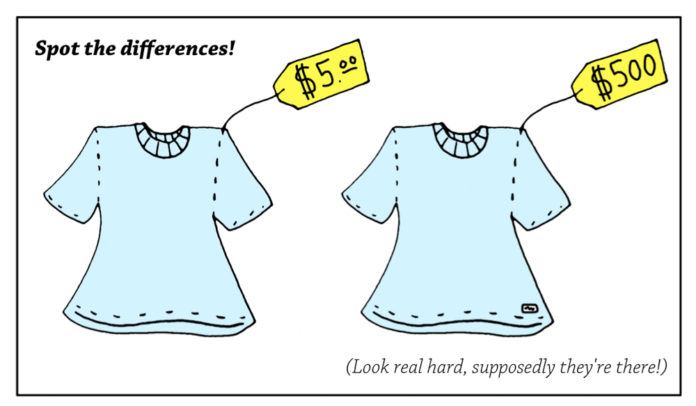As recently as two decades ago, seasons dictated everything in the fashion industry, and what was in a store stayed on the shelf for three months. Today, in stores like Forever 21, Zara and Topshop, throwaway culture is perpetuated by replacing inventory with new items every few weeks instead of restocking popular items that sell out. This business model creates trends and then quickly makes them obsolete, leading consumers to prioritize quantity of clothing over quality. This phenomenon is known as “fast fashion” and is creating immense social pressure to consume in order to stay on trend, while in the process irreparably harming the environment and the laborers involved. Although college-age students are often targets of marketing for fast fashion brands, Occidental students are deciding the convenience of fast fashion is not worth the damage it causes.
According to Urban and Environmental Policy (UEP) professor Mijin Cha, fast fashion is cheap at first glance, but its true cost to the environment is hidden. Fast fashion is second only to oil as one of the biggest polluters of the planet, and most of the textiles used for fast fashion are such low quality they cannot be recycled, Cha said. This means massive amounts of clothing are being discarded in landfills every year.
“Fast fashion only really works if it is cheap, right? And how do you make things cheap?” Cha said. “You make things cheap by not paying people very much money who make the clothes. You make things cheap by manufacturing in places that don’t have very many environmental regulations.”
Cha explained it is hard to see how an individual can change the system, but fast fashion is one where if you stop buying it, companies would stop making it.
“It’s consumer-driven, so if we were to be more responsible consumers, we could actually make quite a difference,” Cha said.
Spruce Bohen (sophomore) lives in a Themed Living Community that focuses on sustainable fashion. Bohen said she and her friends resist the temptation of contributing to fast fashion with frequent visits to the local Goodwill, where they are able to shop sustainably and on a budget.
“It’s a societal issue of systematic overconsumption because fast fashion is cheap and easy, which can be hard to grapple with sometimes and to change our patterns of consumption,” Bohen said. “It is a lot easier than you might think to go to Goodwill and find things that are similar that you can play around with to create similar looks.”
President of the Oxy Fashion Collective EvaMarie David (senior) is using her club to cultivate a conscious mentality about the implications of the fashion choices people engage with on campus. Even with her own confident and individual style, she said she still feels the pressure to engage in trends created by the fast fashion industry.
“Look at Fila’s Disruptor sneakers,” David said. “I bought a pair for a pre-med internship my freshman year for $35. Today, they go for about $70. I thought they were so ugly. The minute these shoes blew up on social media, my notions were challenged. I threw away the pair from freshman year and I just rebought the exact same shoes!”
According to David, the average college-age consumer experiences not only social pressures but also financial pressures, making them a key market for fast fashion.
“I feel guilty that I shopped at Forever 21. It really sucks to know I was part of the problem,” David said. “These places like Forever 21, Zara and H&M that are low-cost to the consumer and high cost to the greater good make it really easy for people to just grab something they really cater to a student budget and allow you to look socially acceptable.”
Luckily for Occidental students, LA is an amazing place to both love fashion and care about the environment, Bohen said.
“You can go to the Goodwill outlet and buy 16 things for $6, so I don’t think it is an excuse to buy fast fashion because it’s cheaper,” Bohen said. “Engaging in sustainable fashion is incredibly cost-effective.”
![]()































